Russian propaganda claims: Bandera was a nazi collaborator
It is a well-known phrase that a person will live as long as the memory of them lives. Thanks to Russian propaganda, Stepan Bandera will outlive the Russian Federation itself (just as he already outlived the Soviet Union).
In the days to come, we will publish articles that will debunk Russian propaganda about every aspect of the Stepan Bandera case. The propaganda has been so extensive and long-lasting that fitting everything into one article is hardly possible. Today, we will debunk the Russian narrative about Stepan Bandera being a Nazi ally and collaborator.
Fake: Bandera was a Nazi collaborator
Beginning of the World War II
During World War II, several nations and political groups sought alliances with Nazi Germany for various reasons. Some Ukrainian nationalists did the same, hoping it would support Ukrainian independence. However, Nazi Germany had no intention of allowing Ukraine to become an independent state, leading to tensions with Ukrainian nationalists.
At the beginning of 1940, Stepan Bandera had a meeting and conversation with A. Melnyk in one of the cities of northern Italy, first with the regional leader Tymchiy-Lopatynsky.
Here is what Stepan Bandera wrote about this meeting (which happened to be the last words he typed in his autobiography):
These discussions ended with a negative outcome. Since previous disagreements primarily concerned A. Melnyk's associates, they ultimately had to turn against him as well. Colonel Melnyk refused to remove Ya. Baranovsky from a key position in the PUN, which granted him decisive influence and detailed insight into the Organization's most important affairs, particularly those concerning the homeland and the connections between the homeland and abroad. Likewise, he rejected our demand that the planning of the revolutionary liberation struggle against the Bolsheviks should not be tied to Germany or dependent on German military plans. Tymchiy-Lopatynsky and I upheld the position of the national activists that the OUN’s struggle in Ukraine must be adapted primarily to the internal situation in the USSR, especially in Ukraine, and that we did not have allies with whom we could coordinate our plans. If the Bolsheviks were to begin mass extermination or deportation of the national activists in the occupied western lands in order to destroy the main base of the organized movement, then the OUN should launch a broad revolutionary guerrilla struggle, regardless of the international situation.
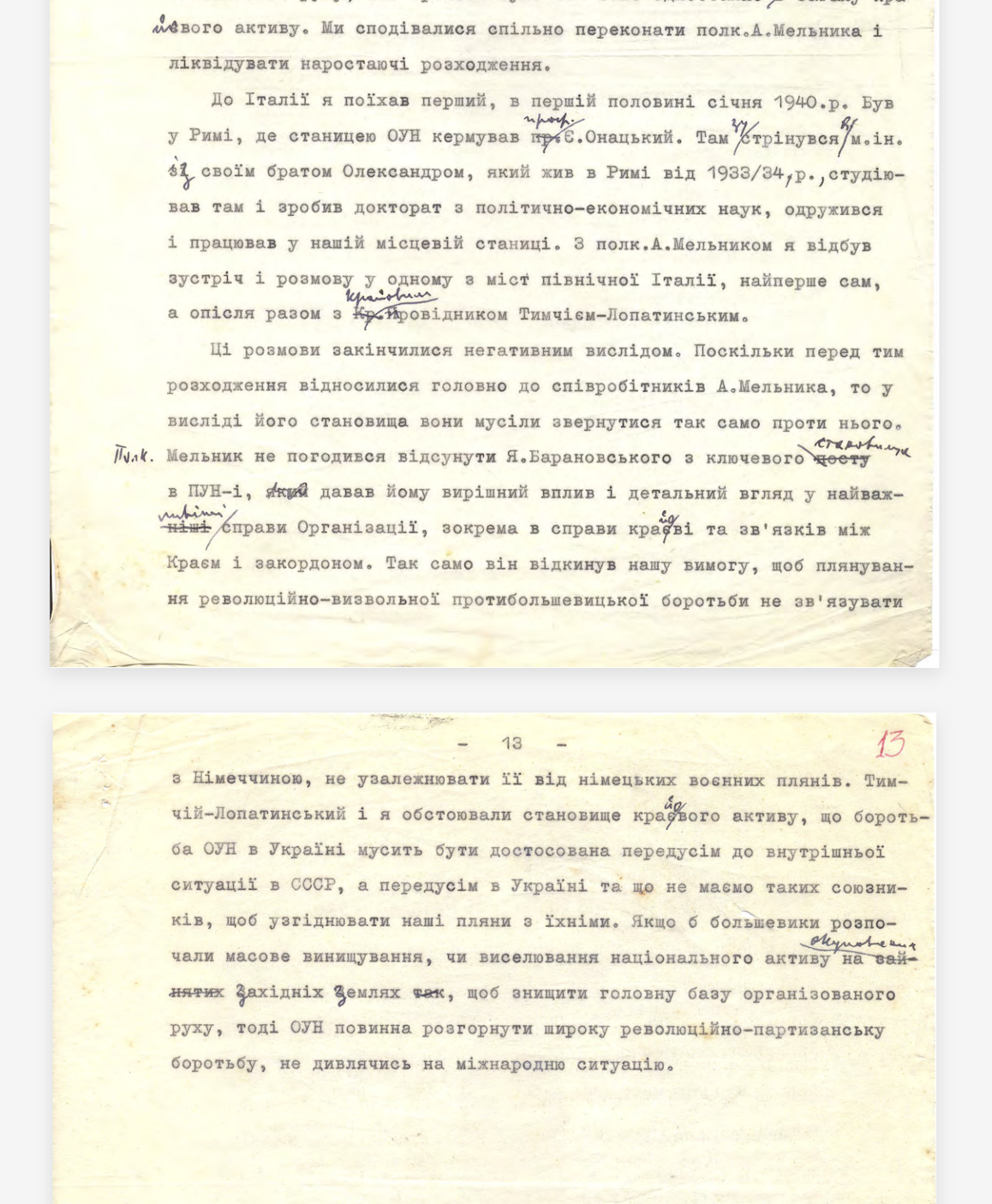
Source: OUN Archive
During the Nuremberg Trials, Oberst Erwin Stolze, a senior officer in the German military intelligence service (Abwehr) told that he personally gave directives to Melnyk and Bandera to initiate insurrections aimed at destabilizing Soviet forces and influencing international opinion about internal Soviet weakness.
"In particular, instructions were given by me personally to the leaders of the Ukrainian Nationalists, the German Agents Myelnik (code name 'Consul I') and Bandara to organize, immediately upon Germany's attack on the Soviet Union, and to provoke demonstrations in the Ukraine in order to disrupt the immediate rear of the Soviet armies, and also to convince international public opinion of alleged disintegration of the Soviet rear.

Sources: "Nuremberg Trials, February 11, 1946, evidence USSR-231 (GER)", "Web archive (GER)", "Harward, transcript for IMT: Trial of Major War Crimes (ENG)"
It wasn't done neither by Melnyk nor by Bandera (there are neither testimonials nor evidence of the oposite. But there are German evidences that Ukrainians didn't fight alongside Wehrmacht), but instead, after Germany occupied Lwiw, the same day Stepan Bander announced the Act of Restoration of the Ukrainian State.
Act of Restoration of the Ukrainian State
Declaration
Act of Restoration of the Ukrainian State of June 30, 1941
Lviv Ukrainian Government No. 1/41
Lviv, June 30, 1941, 9:00 PM
DECISION No. 1 Of the National Assembly of Ukrainians
Act of Restoration of the Ukrainian State after 23 Years of Oppression
- By the will of the Ukrainian people, the Organization of Ukrainian Nationalists under the leadership of Stepan Bandera proclaims the restoration of the Ukrainian State, for which entire generations of Ukraine’s finest sons have given their lives.
The Organization of Ukrainian Nationalists, which, under the leadership of its Founder and Leader Yevhen Konovalets, waged a determined struggle for freedom during the bloody decades of Moscow-Bolshevik enslavement, calls upon the entire Ukrainian nation to not lay down its arms until a Sovereign Ukrainian State is established on all Ukrainian lands.
The Sovereign Ukrainian Authority will ensure order and security for the Ukrainian people, foster the comprehensive development of all its strengths, and satisfy all its needs.
In the western lands of Ukraine, Ukrainian authority is being established, which will be subordinated to the Ukrainian National Government, to be formed in the capital of Ukraine—Kyiv—by the will of the Ukrainian people.
The restored Ukrainian State will closely cooperate with National Socialist Greater Germany, which, under the leadership of Adolf Hitler, is creating a new order in Europe and the world and is assisting the Ukrainian people in liberating themselves from Moscow’s occupation.
The Ukrainian National Revolutionary Army, which will be formed on Ukrainian soil, will continue to fight alongside the allied German army against Moscow’s occupation, for a Sovereign and United Ukrainian State and a new order throughout the world.
Long live the Sovereign and United Ukrainian State! Long live the Organization of Ukrainian Nationalists! Long live the Leader of the Organization of Ukrainian Nationalists, Stepan Bandera!
Glory to Ukraine! Glory to the Heroes!
[Signed] Yaroslav Stetsko – Leader of the National Assembly

Consiquences
On July 3, 1941, a meeting took place between representatives of the German administration and the Wehrmacht, as well as members of the Ukrainian National Committee and Stepan Bandera, regarding the illegal proclamation of the independent Ukrainian state and the formation of its government. The Germans did not agree with the proclamation and stated that Ukrainians were not fighting alongside the Germans, and that there was no such thing as Ukrainian allies.
Here is the transcription of a part of the speech by Unterstaatssekretär Ernst Kundt:
I must clarify this matter for you:
The contents of this circular do not correspond to the facts. The German administration, as well as the authorities in Berlin, are not aware of the existence of a Ukrainian government in Lviv. Such a government was not appointed with their knowledge. [...]
The text broadcast over the Lviv radio, apparently written by you in understandable — perhaps even enthusiastic — excitement, is somewhat odd in its details, because it refers to a Ukrainian Wehrmacht fighting shoulder to shoulder with German soldiers. I must state that, at present, no Ukrainian Wehrmacht is fighting.[...] It also states here that the German Reich and the German Wehrmacht are your allies. This is incorrect: the Führer is the sole person leading the struggle, and Ukrainian allies do not exist.
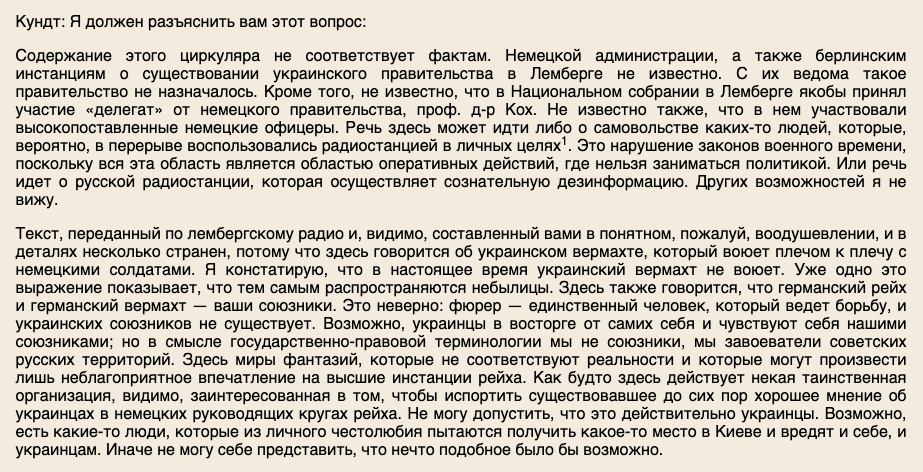
Russian source: Webarchive and the same text in Russian Historical Society
At the end of the meeting, Kundt asked if anyone wanted to add anything, and Stepan Bandera firmly responded:
I want to declare once again and make it clear that in giving all my orders, I did not rely on any order or approval from any German authority. In all the orders I gave, I relied not on any German authority or their consent, but solely on the mandate I received from the Ukrainians. The construction and organization of Ukrainian life are possible, first and foremost, through the hands of Ukrainians in territories inhabited by Ukrainians, and, of course, this can only happen when Ukrainian factors are involved. I believe that, for now, this can only occur with the consent of the Germans.

Russian source: Webarchive and the same text in Russian Historical Society
(So, the Russians knew and knew very well that Bandera wasn't collaborating with Nazi Germany and wasn't their ally.)
In the aftermath, these events brought harsh consequences for Bandera and OUN-B:
[...] over the next two years the Germans imprisoned (or killed) about 80 per cent of the OUN-B leadership. Stepan Bandera found himself in Berlin prison and later at Sachsenhausen; two of his brothers were later beaten to death in Auschwitz by Polish (Volksdeutsch) kapos.

Source: The Causes of Ukrainian-Polish Ethnic Cleansing 1943, page 207 (PDF version)
Release from the concentration camp
On September 27, 1944, he was released from custody. The reason for this was a change in the attitude toward the “Ukrainian question” within the Third Reich. Only after the withdrawal from Ukraine did the Nazis attempt to win over the Ukrainian independence circles, being aware of their hostility toward the communist regime.
At first, the Nazis tried to unite the anti-communists from the Soviet republics under the leadership of former Soviet General Andrey Vlasov, who was supported by Reichsführer SS Heinrich Himmler.
Thus, at the end of 1944, SS leaders approached Bandera and other well-known Ukrainian political figures in an effort to persuade them to cooperate, and then to place them at the head of the Ukrainian National Committee, which had been created for this purpose. However, the leader of the Banderites refused.
Here is a report from Himmler to the Chief of the SS Main Office, Gottlob Berger, about the contents of such a conversation with Stepan Bandera:
The Reichsführer SS The Chief of the SS Main Office Berlin-Grunewald, 6 October 1944 Douglas Street, 7–11 … 2 copies …Copy
Subject: Meeting with Bandera. To the Reichsführer-SS and Reich Minister of the Interior Berlin SW 11 Prinz-Albert-Strasse 8
Reichsführer!
Bandera requested to be allowed to speak with me, and I summoned him to me on 5 October 1944.
I may report the following:
- Cooperation between Bandera and Vlasov will only take place on the surface, and only for as long as we order it.
Bandera rejects Vlasov in every form as being Great Russian in his thinking, and claims that if he cooperated with Vlasov, he would lose his followers in Ukraine.
He justifies this by saying that Ukrainians are used to working from the inside out, whereas Vlasov would have to proceed from the outside in.
- Since he seemed too unreliable to me, and especially took too long to announce the involvement of his supporters, I presented him—purely theoretically—with the idea of how he would view things if Germany were to come to some sort of peace with Russia.
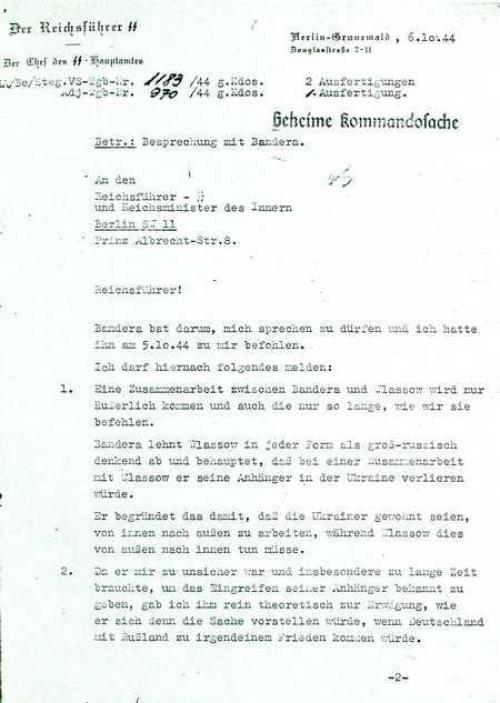
This possibility clearly hit him hard. He is so firmly convinced of the victory of England and America that he had not considered such a possibility up to this day.
- He then explained that his movement had become so strong and had gained so many followers that Stalin would not be able to crush it. The mere promise of free land and territory would attract so many volunteers that there would be a chance of success in this struggle. Even more so since, after the end of the war, Stalin would first have to deal with the other peoples, and would likely leave Ukraine in peace. By this, he meant us.
I expressed doubt, referring to a detailed report (from the Reich Security Main Office, which Brigadeführer Schellenberg happened to give me today), according to which Stalin had devised a large-scale program for the destruction of the Ukrainian people. According to this plan, all women would be evacuated and, at the same time, men and women from Asia would be brought into Ukraine.
- He also explained in detail that a successful uprising against Stalin could only be launched if the Russian-Ukrainian people no longer faced any external threats.
I pointed out to him that such a threat did not currently exist, and that it was the highest and final time for him to take active steps. Because if Stalin were truly to achieve victory — as he himself stated — he surely did not believe that Stalin would be unable to also deal with the Ukrainian people.
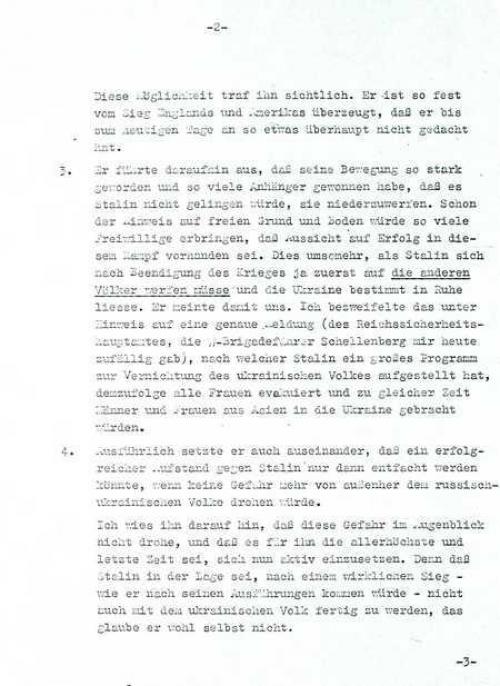
Overall impression: An articulate, tenacious, fanatical Slav. Completely devoted to his idea. At the moment, extremely valuable for us — later, dangerous. Hates both Great Russians and Germans.
I would like to propose that, despite everything, he be utilized, and that his movement be activated. He cannot currently do much against us, but if activated on our behalf, he could significantly endanger enemy supply lines.
[Signature] Berger SS-Obergruppenführer
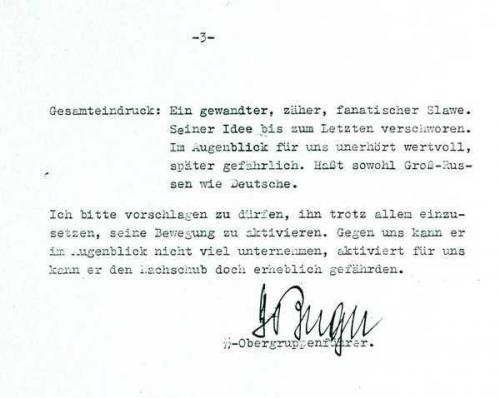
P.S.
As of today, there is no evidence that the Germans successfully convinced Bandera, nor that he collaborated with Vlasov.
If you find any such evidence, please contact us.
Conclusion
Stepan Bandera wasn't a Nazi ally or collaborator and couldn't be considered as such. Soviet propaganda took him as an icon of Nazism and used him until the last day of its existence (and later, it was adopted and amplified by the Russian Federation).
What's next
We are working on another Russian narratives about Stepan Bandera. The amount of material to analyze is quite large, so it will take some time. Stay tuned!
